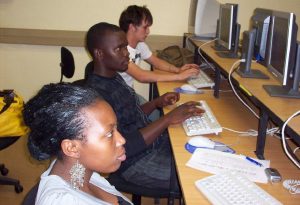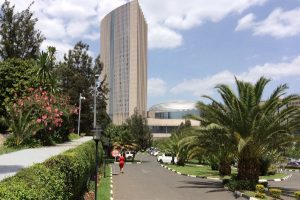-
What We Do
- WHERE WE WORK
-
About Us
 Welcome Message from Carol Jenkins
Welcome Message from Carol JenkinsFor more than 90 years, World Learning has equipped individuals and institutions to address the world’s most pressing problems. We believe that, working together with our partners, we can change this world for the better.
On my travels, I’ve had the opportunity to meet with many of those who have joined us in this mission. In Baghdad, we’ve trained more than 2,300 Iraqi youth who are already giving back at home. In London, our partners in the TAAP Initiative strongly believe that we are all responsible to practice inclusion. And in Vermont, our Experiment in International Living and School for International Training participants prove every day that they have the tools and the determination to change the world.
Please join us in our pursuit of a more peaceful and just world.
- Get Involved
Media Center > Story
Furthering the Use of New Media in Africa
January 19, 2017
When Gary Kebbel was awarded a Fulbright Specialist grant in 2007 to help a university journalism department in Pretoria, South Africa advance its digital media curriculum, he never imagined it would change the focus of his career. But one encounter at Tshwane University of Technology in Soshanguve, a resource-poor satellite campus in Gauteng, about 25-miles outside the city, gave him a glimpse into the future of media.
“I was teaching the students how to blog and about blogging software,” recalls Kebbel. “Everyone was excited except one kid who wasn’t paying attention. He was looking down and pushing buttons on his flip phone. I asked him what was up.”
The student replied he was doing his banking.
“A kid in the middle of the boonies in South Africa doing his banking via SMS. It suddenly struck me — the future of the world is mobile and the U.S. is behind,” he says.
“It changed the entire direction of my career,” Kebbel adds.
Since then, he’s produced two national conferences called MobileMe&You, designed to advance new initiatives and innovations in newsgathering, storytelling and distribution using mobile media.
Kebbel was well placed to be at the forefront of new media. During his time as program director at the John S. and James L. Knight Foundation in Miami, Florida, from 2006–2010, he helped create and run the Knight News Challenge, a $25 million contest to find digital news innovations to be used to improve digital communication and community engagement.
“I spent four years talking to people at the cutting edge about what worked and what didn’t work,” Kebbel says about the contest.
He also helped create the Knight Citizen News Network and the Knight Digital Media Center.
 The Fulbright Specialist Program was established in 2001 to connect U.S scholars and professionals with their counterparts at host institutions overseas for short-term collaborative projects.
The Fulbright Specialist Program was established in 2001 to connect U.S scholars and professionals with their counterparts at host institutions overseas for short-term collaborative projects.
As Kebbel says, “I could have never gotten off for a semester. This was a game-changer.”
Following the Knight Foundation, Kebbel served as dean of the College of Journalism and Mass Communications at the University of Nebraska-Lincoln and during his tenure from July 2010 to June 2012 his college created the nation’s first Drone Journalism Lab. He left that post to work on creating the university’s Center for Mobile Media.
 He received another Fulbright Specialist grant in 2014, this time working with the U.S. Mission to the African Union (AU), a cooperative organization made up of 54 African nations. He advised the AU’s Communications Directorate in Addis Ababa, Ethiopia, on a strategy to incorporate social media into crisis communications.
He received another Fulbright Specialist grant in 2014, this time working with the U.S. Mission to the African Union (AU), a cooperative organization made up of 54 African nations. He advised the AU’s Communications Directorate in Addis Ababa, Ethiopia, on a strategy to incorporate social media into crisis communications.
“I like the idea of mobile media for developing countries. They are leap-frogging developed countries in this area,” he says.
“Anybody not focusing on mobile media is truly doing so at his or her peril,” he adds.
The power of mobile media — which he’s seen first-hand in Africa as a consultant for the U.S. Department of State in regards to elections in Kenya in 2012 and Nigeria in 2014 — is the way it’s changing power structures.
“By its very nature, mobile media takes power away from power structures and gives it to the people,” observes Kebbel, who also did stints in Tunisia, Taiwan and Russia as a U.S. Department of State trainer.
Kebbel was named a national peer reviewer of Fulbright applications for the Specialist Program, serving one year from spring 2015 -2016.
He has also worked with the Foreign Service Institute in Washington, D.C training public affairs officers.
A veteran newsman, Kebbel served as a founding editor of USATODAY.com and Newsweek.com, the home page editor of the Washingtonpost.com and news director at AOL. These days, however, he sees the growth of media through the lens of his Fulbright Specialist experience.
And for that reason he says, “I would encourage other people to do it,” referring to the program, because “doing this kind of work helps you understand other people. Academics pass that learning along to their students.”
The Fulbright Specialist Program was established in 2001 by the U.S. Department of State and the Bureau of Educational and Cultural Affairs (ECA) to enable U.S. professionals and scholars to work on short-term projects overseas in conjunction with local host institutions.
For more information about the Fulbright Specialist Program or to apply, please go to: https://fulbrightspecialist.worldlearning.org/the-fulbright-specialist-program/





